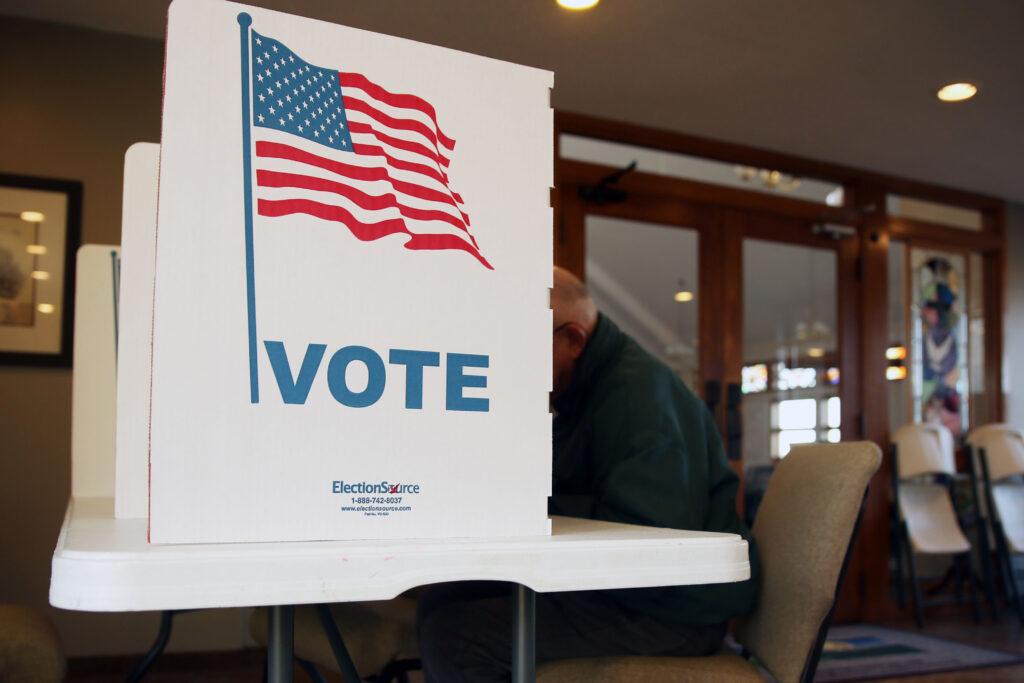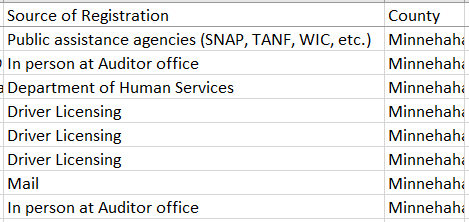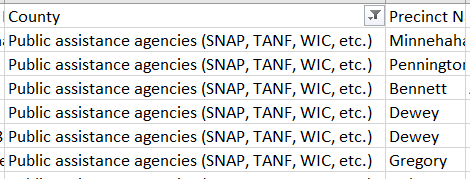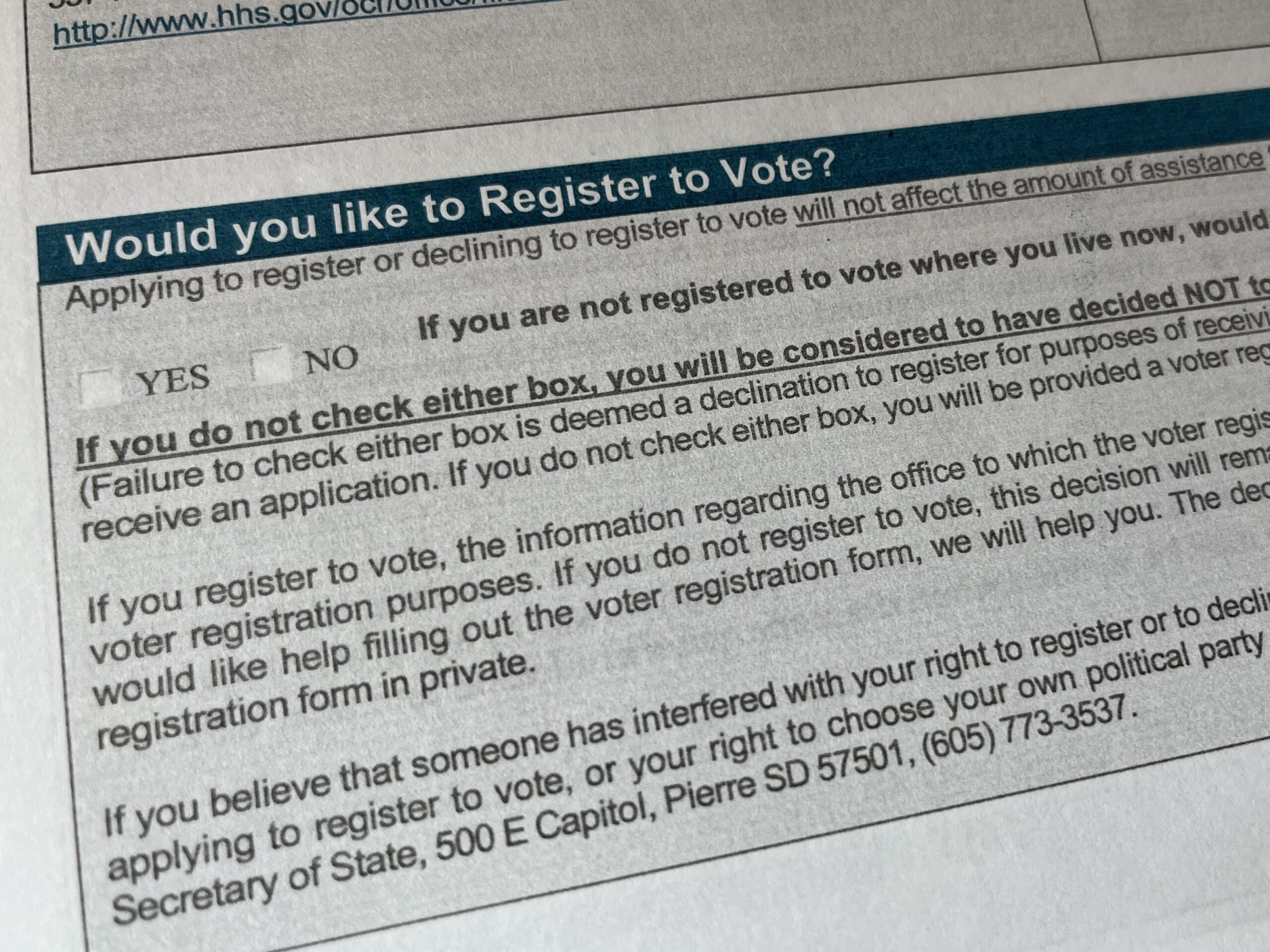
A Sioux Falls resident votes in the city and school board election at Southern Hills United Methodist Church on April 9, 2024. (Makenzie Huber/South Dakota Searchlight)
Thousands of South Dakotans have been publicly labeled as applicants for government assistance and thousands more have had their email address and phone number exposed, due to a new state law and the way the state’s election office is implementing it.
Although the legislation creating the law received some Democratic votes, it’s a product of the Republican-dominated Legislature. Republican Gov. Larry Rhoden signed it into law and Republican Secretary of State Monae Johnson is carrying out its provisions.
Several legislators, both Democrats and Republicans, are now telling South Dakota Searchlight they did not intend for the law to expose sensitive information — especially the identity of public assistance applicants.
“This is what happens when you put the wrong people in charge,” said state House Minority Leader Erin Healy, D-Sioux Falls, who voted against the bill. “We talk a lot about freedom and privacy in this state, so it’s a shame that this legislation led to this type of breach.”
About the new law
The legislation passed in March. It requires the Secretary of State’s Office — which oversees elections — to make the state’s entire voter registration list freely available online, after the list was previously available only for a $2,500 fee.
Activists who favor the hand-counting of ballots, oppose the use of vote-counting machines and deny the legitimacy of the 2020 presidential election were among those who promoted the legislation as an “election integrity” measure.
When the law took effect July 1, the Secretary of State’s Office made the statewide voter registration list freely available on its website, containing information about 668,419 registered voters.

South Dakota Searchlight downloaded the list and found it included information such as each voter’s name, political party and address. It additionally included phone numbers and email addresses, if voters provided those two pieces of optional information while filling out their voter registration form, or if the information was automatically included when voters registered through another government form, such as an application for a driver’s license.
There was also a column identifying where and how voters registered, such as at a driver’s exam station, a disability services office, a military recruitment center, or while applying for assistance from the Supplemental Nutrition Assistance Program, the Temporary Assistance for Needy Families program, or the Women, Infants and Children program.
In all, 7,186 people were labeled as having registered to vote while applying for some form of public assistance, according to a Searchlight analysis.
Past practice called into question
After the initial publication, the Secretary of State’s Office updated and replaced the older version of the spreadsheet. The newer version no longer includes columns devoted to how a voter registered, but the information still appears under the “County” column for some voters.
A spokesperson for the office told South Dakota Searchlight in an emailed statement that the free spreadsheet contains the same information that was “traditionally” available by paying the $2,500 fee. The office has not responded to further questions from Searchlight.

The South Dakota Democratic Party regularly purchased the information in the past. Executive Director Dan Ahlers, a former legislator, said past spreadsheets did not identify voters as having registered while applying for public assistance.
“I think the trust between South Dakotans and the state government has certainly been damaged here,” Ahlers said. “I think leadership has to answer for it. This is something the secretary of state will need to answer to the Legislature about: why this happened and how it can be avoided.”
Former secretary of state and current Public Utilities Commissioner Chris Nelson, a Republican, said lists compiled by his staff while he was secretary of state from 2003 through 2010 did not disclose how voters registered.
“It wasn’t a data item where you could go through a whole list and sort voters by how they registered to vote,” Nelson said.
Possible lawsuit predicted
Samantha Chapman, advocacy manager for the American Civil Liberties Union of South Dakota, said the release of confidential information could open the state up to a lawsuit.
She said the state is essentially forcing public assistance applicants to avoid registering to vote if they want their application to remain private.
window.addEventListener(“message”, function(event) {
var message = JSON.parse(event.data);
if (message.sender == “Flourish” && message.context == “iframe.resize”) {
src = message.src.replace(/#.+$/, “”);
vizFrame = document.querySelector(‘iframe[src=”‘ + src + ‘”]’);
vizFrame.setAttribute(‘height’, message.height);
}
});
“But those who register to vote now have to consent to having that information open to the public,” Chapman said.
The National Voter Registration Act requires public assistance agencies to facilitate voter registration, and to relay that voter information to county auditors and the Secretary of State’s Office. But multiple federal laws protect the confidentiality of individual public assistance records.
Additionally, a state law says any record concerning an applicant or recipient of public assistance through the Department of Social Services is confidential. There are exceptions for “inspection by any person duly authorized by this state or the United States in connection with the person’s official duties,” and “for the purpose of fair hearings as provided by law.”
When asking public assistance applicants if they’d like to register to vote, the state Department of Social Services economic assistance application says “information regarding the office to which the voter registration form was submitted will remain confidential and be used only for voter registration purposes.”
In response to Searchlight questions about the legality of the state’s actions, South Dakota Attorney General Marty Jackley said he is appointing lawyers from his office to discuss the matter with the Secretary of State’s Office.
The ACLU of South Dakota sent a letter Thursday to the Secretary of State’s Office asking it to:
- Remove copies of the statewide voter registration file from its website.
- Remove from the file all data about the method by which a person registered to vote.
- Notify all South Dakota registered voters whose confidential information was exposed.
- Update language on its website clarifying what registration information is public and clarifying that voter registrations completed through a public assistance office will remain confidential.

Rapid City Republican Rep. Heather Baxter was the main sponsor of the legislation requiring free publication of the voter registration list. She said this week it wasn’t her intention to publicize how voters registered. She only wanted information necessary to verify South Dakota’s voter rolls and to contact voters about their registration’s accuracy.
The bill’s lead Senate sponsor, Rapid City Republican John Carley, expressed similar motivations.
“All the bill did was make the voter registration file available at no cost to the public,” Carley said. “The source information wasn’t included in the voter registration file before this law and it shouldn’t be there after.”
Legislators are all included in the spreadsheet, because they have to be registered to run for office. That means their address — and their phone number and email address, for those who provided them — are available to the public, even though legislative leaders removed lawmakers’ addresses from the legislative website last month. The decision was motivated by safety concerns after the shootings of two legislators and their spouses at their homes in Minnesota.
Complaints extend to list’s accessibility, impact on campaigns
Carley is also upset with the Secretary of State’s Office for the way it’s publishing the list. The office initially posted it as a simple download link. Since then, the office has added an online form that has to be filled out first. After filling out the form — which requires information including a name, address, phone number and email — the website auto-generates an email containing download links.
Carley said the form hinders transparency and invades privacy.
“This is public information the taxpayer is paying for, so there shouldn’t be a mechanism to track individuals,” he said.
Lincoln County Auditor Sheri Lund said privacy concerns are causing more people to submit new voter registration forms without the optional phone number and email address, so that those pieces of information won’t be publicly available.
GET THE MORNING HEADLINES.
Lund has been informing voters about the matter since lawmakers passed the bill in March.
“I think people are concerned about it and don’t know what the benefit of doing it was,” Lund said. “I don’t understand. There is no control over whoever is downloading that information.”
Lund said she’s not opposed to the information being available at no cost, but she’d rather have the request go to county auditors and “not be available for anybody to go through online.”
Campaigns are the typical users of the phone numbers and email addresses, Lund said, but she expects that to become more difficult as more voters file new forms to retract the information.
“It’s going to be harder for people running for positions to talk to voters if they want to call or text,” Lund said. “Otherwise, they’ll just reference the list for mailing information. There’ll be more mailers, so the post office should be happy.”


